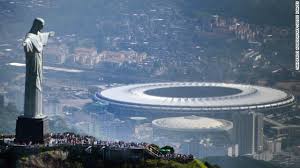By Samindra Kunti
January 27 – Rio de Janeiro’s famous Maracana stadium, which hosted the 2014 World Cup final and the opening ceremony of the 2016 Olympics and is one of football’s spiritual homes, was plunged into darkness on Thursday after Light, the energy provider for the stadium, cut off the electricity supply due to unpaid bills that reach back to October last year.
In a statement the company says that it is owed 3 million Brazilian reals ($940,000). Odebrecht, the consortium managing the stadium, owns 1.3 million reals ($410,000) and the rest is due from Olympic organisers.
“Light and us, we have a separate deal,” explained Mario Andrada, a spokesman for Rio 2016 organisers. “They owe us money as a sponsor, and we owe them money for energy during the games.”
In the last weeks the Maracana has rapidly fallen into disrepair. The stadium was looted with thieves stealing television sets and two bronze busts, including the bust of journalist Mario Filho after whom the stadium is officially named.
Odebrecht had asked the state of Rio de Janeiro to take over management, but following the hosting of the 2016 Olympic Games the state of Rio de Janeiro is in a severe financial crisis, having declared a ‘financial calamity.’ For months, teachers, nurses, and other public employees, and pensions have not been paid.
The Maracana was constructed for the 1950 World Cup and was revamped for the 2014 World Cup and the 2016 Olympic Games. The stadium was also refurbished for the Club World Cup in 2000 and the Pan American Games in 2007. The Maracana famously hosted the final of 2014 as well as the 1950 final when Uruguay beat Brazil 2-1 to lift the trophy.
The Maracana’s gates were locked again after the closing ceremony of the 2016 Paralympics left a seven-metre by four-metre hole in the turf. Botafogo, Flamengo, Fluminense and Vasco da Gama, Rio’s four big clubs, have all played at the Maracana.
The stadium may now become another white elephant in Brazil’s big event hosting sporting legacy. The Arena da Amazônia in Manaus, where England played their opening game at the World Cup three years ago, has been in disuse, while the Estadio Mane Garrincha in the capital Brasilia has become a de facto bus station.
Contact the writer of this story at moc.l1751418421labto1751418421ofdlr1751418421owedi1751418421sni@n1751418421osloh1751418421cin.l1751418421uap1751418421

